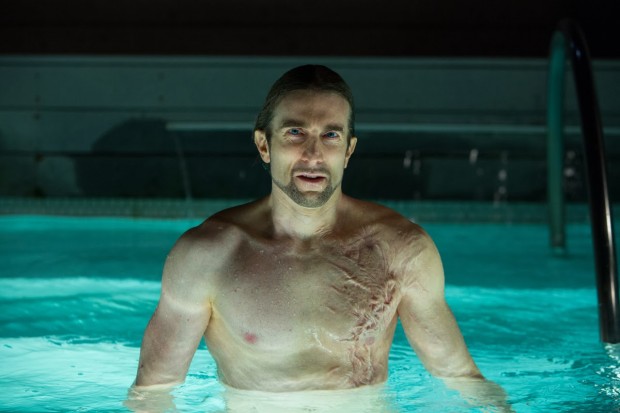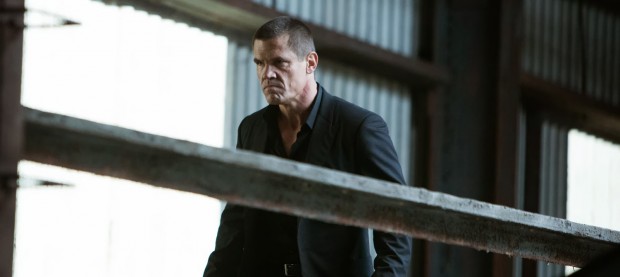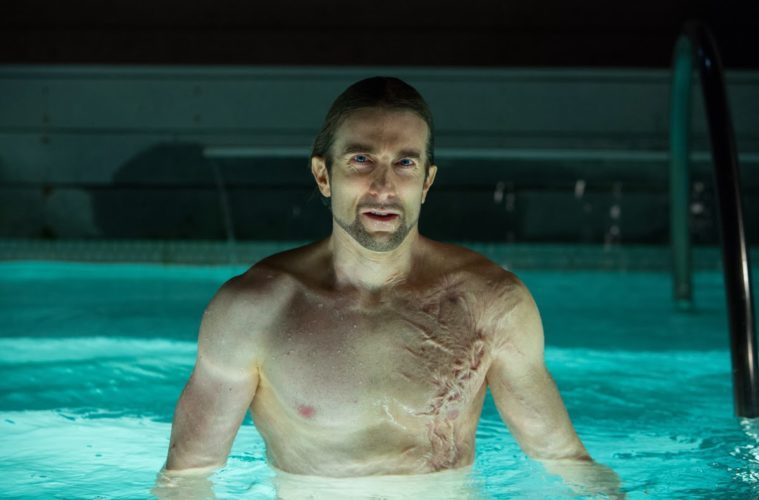
Although few in recent years have skyrocketed into a mainstream spotlight as quickly as Sharlto Copley, one, when looking over his filmography, is likely to be most impressed by an ability to balance projects on either end of the budget and exposure spectrum. Following back-to-back roles in the Matt Damon-led Elysium (a reunion with District 9 helmer Neill Blomkamp) and Magnolia-released Europa Report, his next project might land somewhere in-between: Oldboy, in which an out-of-bounds actor goes into even stranger, darker territory for director Spike Lee‘s small, violent reworking of the well-known South Korean thriller.
The unusual turn is something we jumped into almost immediately, and how quickly it leads into a fuller discussion would, I think, speak to the uniformity of Copley’s performance. For both this and notices of his experience in every corner of the film industry, read on.
The Film Stage: You’re calling from South Africa. What’s happening there?
Sharlto Copley: I’m shooting Chappie, again with Neill — the robot movie that he’s doing here.
How far into that are you?
We’re about… a third of the way?
That’s nice to hear. Given the project we’re meant to discuss, I think it’s only appropriate that I’d talk to you through an iPhone speaker.
[Laughs] That’s awesome. Yes, it is very appropriate.
Hopefully this goes a little better than what occurs onscreen.
I hope it goes better. Be nice to me! Be nice to me, Nick! That’s all I can say, you know? I’m sensitive, man.
That’s actually a good place to start, because I’d like to talk about, first, how you developed this character through voice acting; your initial presence is only through a phone, and what we hear of you is this very strange, off-kilter voice. Could you talk about building this from the ground-up?
Yeah, the voice: it’s funny, because, for me, voice is the single most important thing in a character, and every aspect of the voice. Obviously the most important is the accent, because that informs a whole bunch of stuff, for me, that I would be drawing on — usually kinds of stereotypes, and things that are associated with an accent. Very specifically, there are all sorts of subtleties within the voice. It was quite bizarre that, in this particular case, the general inspiration for the voice came from a make-up artist that I’d worked with on a previous film. And I said to him, during the film, I was like, “Dude, do you mind if I use it?”
And it actually isn’t “him” — none of his friends would say “it sounds like you” — but it was a certain feeling: sort of the more quietly spoken guy, most of the time, and a certain energy to the voice. So I generally try and base the voices — and, actually a lot of the time, the characters — on real people, or these real stereotypes in society, and pick pieces of those stereotypes to sort of build on the character.

What was Spike Lee’s first reaction to that delivery?
He liked it; I think he said it was creepy. [Laughs] The idea of making him English came from Spike, and I thought, “Okay, that’ll be cool.” He was going to be upper-class, so you narrow it down to what kind of voice you could use; I opted to sort of make the character… I went for this option that he’s bisexual, which kind of maybe does and maybe doesn’t come across in the film, because of what had happened to him — that he had a lot of issues around love and sexuality. So, that was sort of an additional sort of element that I thought would make sense, given the story, that I brought.
When we finally do see you, the physical movements require a bit of adjustment — the way you’re moving around, or even handling individual objects. It’s graceful, which I found very entertaining. How did you match a physical performance with the voice?
Yeah, there was a lot… I mean, it was the most work I’d ever had to do on a character. I had my girlfriend, literally, at home, driving her crazy, but she would help me with certain things — every time I picked up a glass, or drank a cup of tea, she’d say, “No, no, your finger’s not out!” She was my sort of “coach” at home, and it was probably the most “method” I’d been, in the sense of having to be in the character quite a lot to repress my natural energy levels, for example, to really control the movement. The voice came very, very easily.
Eventually, because I did it enough, the movements started to actually stay with me for a little while afterwards. Little things, little mannerisms that I had developed and forced myself into kind of doing as a habit — so, it was a very interesting experience for me. It was a character that’s the darkest thing I’ve ever done; I don’t think I’ll ever do something like that again, in my life probably. But it’s an experience that, from a professional point-of-view, I’m glad I did.
Is that part of the attraction, too, playing something this dark? Between Oldboy and this summer’s Elysium, it feels as if you really did take on relatively “intense” things in your two biggest roles this year.
Yeah, I think it’s more about what I was offered. It’s, “Well, these are the roles that are on the table for you — you want to be a working actor, and this is what Hollywood’s offering you.” I don’t know that I would say I’m particularly fascinated with the darker side of the world, or anything like that — I’m not, really, to be honest, as a person. I wouldn’t describe myself as the type of brooding, dark actor with a million issues that he wants to go into characters to explore; I just find it an interesting challenge, to entertain audiences. That’s my number-one thing, you know?
So, while I was sort of method-ing out on the mannerisms (or whatever) of this character, it didn’t mess me up psychologically, you know — because even something as dark as Oldboy, I wasn’t, like, “Oh, it’s a dark world.” It’s adapting, for me. I don’t allow it to mess with me too much.

I was struck by a number of the sequences that put you front and center, in particular. There’s a lengthy tracking shot where you’re walking with Josh Brolin, and it’s the sort of visual flourish you wouldn’t necessarily expect at that given moment. So, what is it about Spike Lee that distinguishes him from other filmmakers you’ve worked with? Moments such as that use of the camera?
I think it’s everything. Each director is different. It started, for me, with the fact that Spike has an enormous humanity to him, which I didn’t necessarily expect, from the perception I had gotten through the media, or whatever. He’s an amazing… I don’t know, there’s a humanness to the man, when you’re dealing with him one-on-on that I found amazing, and I feel really blessed to have just met him and worked with him and known him, just as a person.
And, then, as an artist, I mean he really is a true artist. You’re pointing out exactly the things like the shots on the Steadicam — I know the shot you’re talking about — or the sequences where he would very often do that, where it just goes, man; you just go right into the sequence and run the whole thing, and he runs it on-camera. He has a real “artistic” take on the medium — you definitely get the sense that he’s not trying to play to commercial tastes, or anything like that, that the man is a genuine artist. Like or don’t like it, he’s producing art, which is refreshing in the whole… you know. [Laughs] Which is why, I suppose, he doesn’t work in the whole Hollywood system, I guess, is he is a genuine artist.
Well, one of the things I’ve liked about your career thus far is how you volley between big-budget material and independent fare — just this past summer you had both Elysium and Europa Report, the latter of which was primarily seen on a format like VOD. How do you find a middle ground in getting material?
I mean, I think it’s really, for me, a combination of trying to develop a career based on doing some very different roles. So, I suppose the most important thing, for me, is, “What can I do with a character that I’m being offered?” It doesn’t really matter so much, to me, whether the forum is a bigger forum or indie forum; I’m just really trying to be a working actor, if that makes sense, so there’s only so many big films that I’ve made — there’s a lot of competition to get into those — and, on the smaller-scale stuff, there’s interesting material.
You know there’s this movie, Hardcore, that I just did in Russia; it’s probably the lowest-budget movie I’ve done, but it’s, without question, the most original film that, I think, has been made in a long time, in the sense that the entire movie is from the POV of a GoPro. It’s from this director who did the Bad Motherfucker shorts online, Ilya Naishuller — I don’t know if you saw that — and going to work in Russia… I enjoy that. I enjoy finding characters that are, maybe, a little different for me, something I haven’t done before — and, then, directors making something really different.
Europa, it was just a supporting role, but I think what they were trying to do was noble; with the amount of money they had, it was really sort of “true” science fiction in a more technically “true” sense. I wanted to try and support that. Something like the Open Grave movie was sort of a European art-house take on the horror genre, which is, again, just something very different — that’s an ensemble movie. So, yeah, I think mostly it’s about characters, for me, and getting the opportunity to play different ones.
Oldboy opens on Wednesday, November 27.

